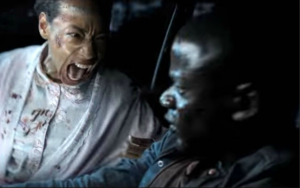GET OUT: 4 STARS. “most original psychodrama since The Babadook.”
 Funnyman Jordan Peele isn’t the first name you think of when you think of horror, but his new movie, “Get Out,” might change that. The “Key & Peele” star has dropped the satire that made his name in favour of scares.
Funnyman Jordan Peele isn’t the first name you think of when you think of horror, but his new movie, “Get Out,” might change that. The “Key & Peele” star has dropped the satire that made his name in favour of scares.
College students Rose and Chris, played by Allison Williams and Daniel Kaluuya, have reached the point in their relationship when it’s getting serious and it’s time for him to meet her parents.
“Do they know I’m black?” he asks. “It seems like something you might want to mention. I don’t want to get chased off the lawn with a shotgun.”
She assures him race is a nonissue—“My dad would’ve voted for Obama third time if he could have,” she says. “They are not racist.”—as they head to her leafy up-state hometown to meet parents hypnotherapist Missy and neurosurgeon Dean (Catherine Keener and Bradley Whitford). After a few days Chris feels uneasy. A police officer demands to see his driver’s license even though he wasn’t driving the car and Dean is friendly, but strange. “How long has this been going on,” dad asks, “this thang.”
The atmosphere of apprehension builds during a garden party thrown on Missy and Dean’s estate. “It’s like they’ve never met a black person who didn’t work for them,” Chris says. Guests make inappropriate remarks and the only other African American attendee (Lakeith Stanfield) is standoffish until a flash bulb triggers a seizure. “Get out!” he screams over and over, attacking Chris. Unnerved Chris wants to leave, but finds himself trapped, wondering if his hosts are racist and deadly or just racist.
Back in the city Chris’ best friend, TSA agent Rod (LilRel Howery), is worried about his friend. After a google search or three Rod becomes convinced Chris has been kidnapped and his being used as a suburban sex slave.
“Get Out” is the weirdest and most original mainstream psychodrama to come along since “The Babadook.” The basic premise harkens back to the Sidney Poitier’s classic Guess Who’s Coming to Dinner. In that film parents, played by Spencer Tracy and Katharine Hepburn, have their attitudes challenged when their daughter introduces them to her African American fiancé. The uncomfortable situation of meeting in-laws for the first time is universal. It’s the added layers of paranoia and skewered white liberalism that propels Chris’ situation into full-fledged horror. In this setting Chris is the other, the stranger and as his anxiety grows the social commentary regarding attitudes about race in America grows sharper and more focussed.
The first hour is a slow burn, a gradual build to the weird behaviour that comes in the final third. Peele skilfully shapes the story, carefully adding layers of horror and humour (mostly courtesy of Howery) that grows to a bloody climax. The subtlety of the first hour is abandoned near the end when the movie shifts tone from a sinister Kubrickian feel to something more akin to an 80s slasher flick.
Kaluuya is the film’s beating heart. Williams, Keener and Whitford, who somehow make their mundane WASPy behaviour creepy as a facebook message from your high school gym teacher, ably back Kaluuya. Add to that Walter Marcus Henderson and Betty Gabriel as the otherworldly, possibly lobotomized handyman and housekeeper and you have the elements of a memorable night at the movies.
“Get Out” is a horror film—there are all manner of shocks and jumps—but like all great genre films it isn’t just that. It could more rightly be called a social thriller, a film that looks at everyday ills—in this case racial tension—through the lens of a genre movie.
